13 Best Herbal Teas For Cramps
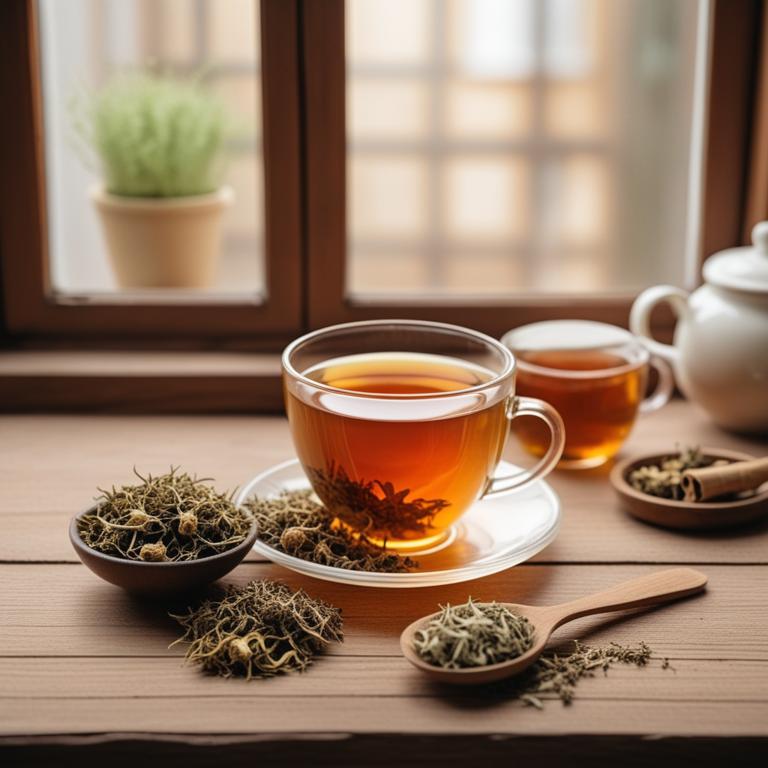
Herbal teas for cramps are a natural remedy made from various plants and herbs that are used to alleviate menstrual cramps, also known as dysmenorrhea.
These teas are beneficial as they help to relax the uterine muscles, reduce inflammation, and promote a sense of calm, providing relief from the discomfort and pain associated with cramps.
Examples of herbal teas that are commonly used to treat cramps include ginger tea, which has anti-inflammatory properties that help to reduce pain and inflammation; chamomile tea, which promotes relaxation and calms the mind and body; peppermint tea, which has a soothing effect on the digestive system and helps to ease cramps; raspberry leaf tea, which helps to tone the uterine muscles and reduce cramping; and red clover tea, which is rich in isoflavones that help to ease menstrual cramps and promote relaxation.
By incorporating these herbal teas into one's routine, individuals can find natural relief from cramps and maintain a sense of well-being during their menstrual cycle.
According to "Journal of midwifery & women's health", teas for cramps may be effectively relieved by consuming a mixture of saffron, celery seed, and anise extracts, as evidenced by a reduction in pain scores and duration in participants who took these extracts in a randomized, double-blind, placebo-controlled pilot trial.
Below there's a list of the 13 best herbal teas for cramps.
- 1. Vitex agnus-castus teas
- 2. Valeriana officinalis teas
- 3. Trifolium pratense teas
- 4. Lavandula angustifolia teas
- 5. Matricaria chamomilla teas
- 6. Melissa officinalis teas
- 7. Mentha x piperita teas
- 8. Glycyrrhiza glabra teas
- 9. Cinnamomum zeylanicum teas
- 10. Avena sativa teas
- 11. Foeniculum vulgare teas
- 12. Taraxacum officinale teas
- 13. Zingiber officinale teas
Also you may be interested in...
TODAY'S FREE BOUNDLE
Herb Drying Checklist + Herbal Tea Shopping List + Medicinal Herbs Flashcards
Enter you best email address below to receive this bundle (3 product valued $19.95) for FREE + exclusive access to The Aphotecary Letter.
$19.95 -> $0.00
1. Vitex agnus-castus teas
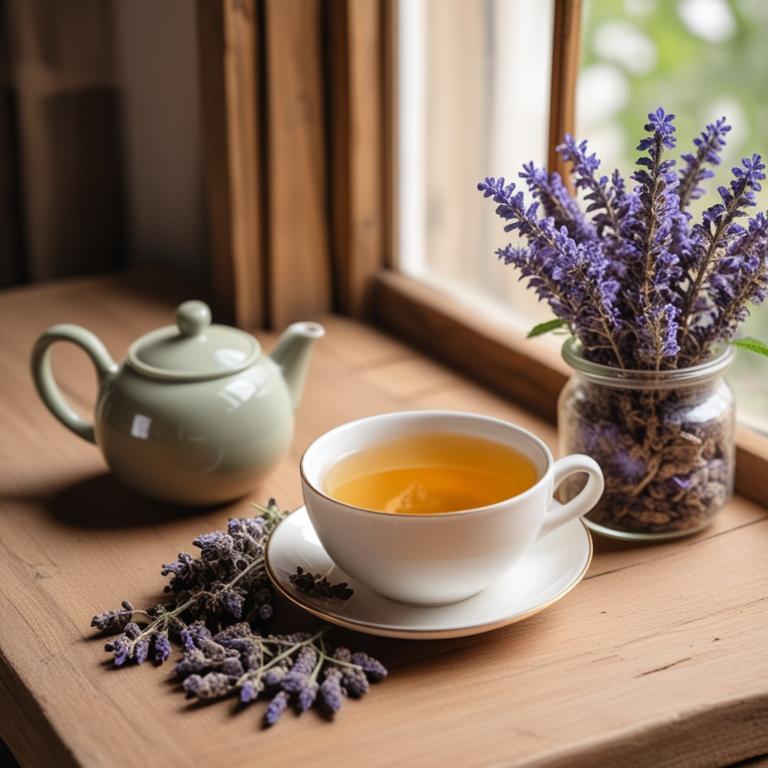
Vitex agnus-castus teas have been traditionally used to treat menstrual cramps due to their anti-inflammatory and antispasmodic properties.
The bioactive constituents, including iridoids, flavonoids, and phenolic acids, help to reduce pain and inflammation by relaxing the uterine muscles and regulating hormonal imbalances.
This herbal preparation helps to alleviate menstrual cramps by modulating the body's hormonal response to estrogen and progesterone, thereby reducing the severity and frequency of cramps.
The benefits of using Vitex agnus-castus teas to treat menstrual cramps include reduced pain, improved menstrual regularity, and a decrease in the overall severity of symptoms associated with PMS.
Related Study
According to "Archives of gynecology and obstetrics", Vitex agnus-castus teas for cramps may be effective in reducing pre-menstrual syndrome (PMS) symptoms, with a 42.5% score reduction of the Moos' menstrual distress questionnaire (MMDQ) as the main effect parameter.
2. Valeriana officinalis teas

Valeriana officinalis teas have been traditionally used to treat menstrual cramps due to their analgesic and antispasmodic properties.
The bioactive constituents, including valerenic acid, isovaleric acid, and valepotriates, help to relax the uterine muscles and reduce pain by inhibiting the release of prostaglandins, which are hormone-like substances that cause contractions.
By reducing inflammation and muscle spasms, Valeriana officinalis teas provide relief from menstrual cramps, making them a popular natural remedy for this common condition.
The benefits of using Valeriana officinalis teas to treat menstrual cramps include a reduction in pain intensity, improved sleep, and a decrease in the frequency and severity of menstrual cramps.
3. Trifolium pratense teas
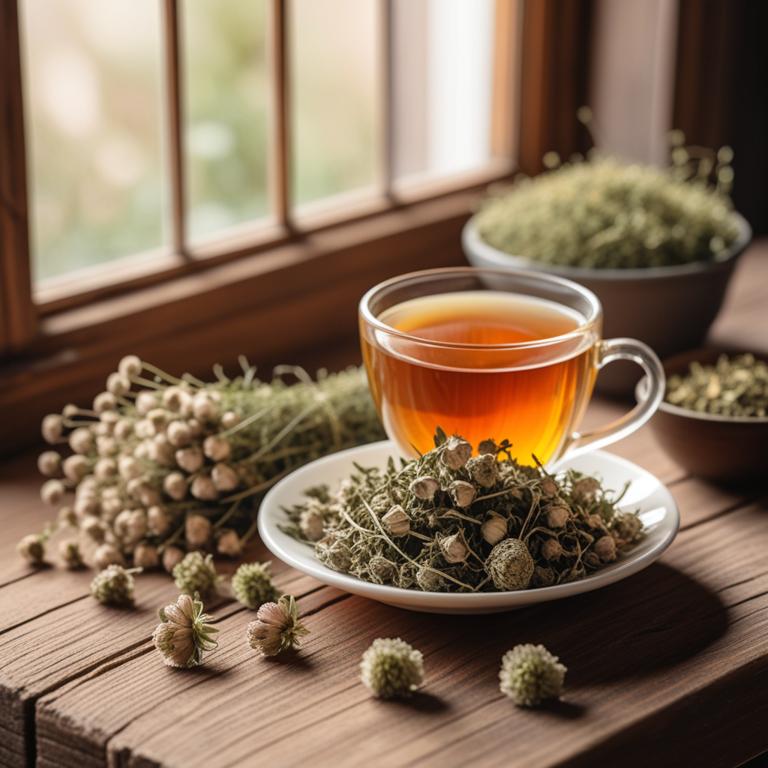
Trifolium pratense teas, also known as red clover teas, have been traditionally used to treat menstrual cramps and other symptoms associated with PMS.
The bioactive constituents of red clover teas, including isoflavones and coumarins, help to relax uterine muscles and reduce inflammation, thereby alleviating cramps and discomfort.
The benefits of using red clover teas to treat menstrual cramps include reduced pain, improved mood, and a decrease in symptoms of anxiety and depression.
Regular consumption of red clover teas has also been shown to have a positive effect on hormone balance and may help to regulate menstrual cycles.
Related Study
According to "Electronic physician", Trifolium pratense teas for cramps, specifically red clover, were found to be effective in the treatment of acute menopausal syndrome, including symptoms such as cramps.
4. Lavandula angustifolia teas

Lavandula angustifolia teas have been traditionally used to treat menstrual cramps due to their anti-inflammatory, antispasmodic, and analgesic properties.
The bioactive constituents present in these teas, including linalool and linalyl acetate, help to relax the uterine muscles and reduce spasms, thereby alleviating cramp symptoms.
The benefits of using Lavandula angustifolia teas for menstrual cramps include reduced pain and discomfort, improved sleep, and a decrease in the frequency and severity of cramps.
By consuming these teas, individuals can experience natural relief from menstrual cramps and improve their overall quality of life.
Related Study
According to "Oxidative medicine and cellular longevity", Lavandula angustifolia teas may be beneficial for cramps due to its spasmolytic effect, which is attributed to the active compounds present in the plant.
5. Matricaria chamomilla teas
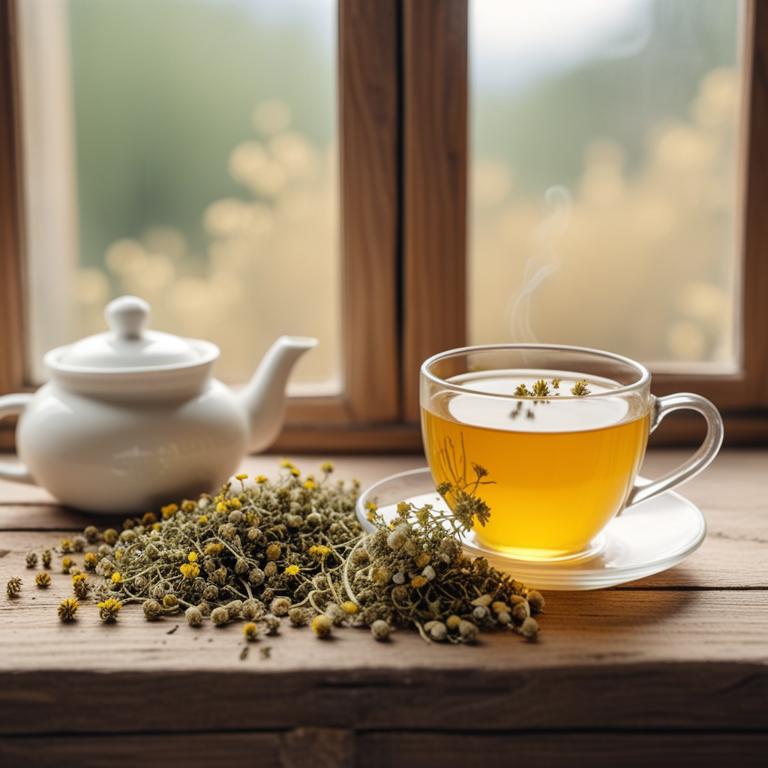
Matricaria chamomilla teas have been traditionally used to treat menstrual cramps due to their soothing and anti-inflammatory properties.
The apigenin, a bioactive constituent present in chamomile, helps to relax the uterine muscles and reduce spasms, providing relief from cramping.
Additionally, the tea's anti-inflammatory effects, attributed to its flavonoids and terpenoids, may also contribute to its analgesic and anti-spasmodic properties, helping to alleviate menstrual discomfort.
Regular consumption of Matricaria chamomilla teas may offer benefits in reducing menstrual cramp severity, promoting relaxation, and improving overall well-being during the menstrual cycle.
Related Study
According to "European journal of obstetrics & gynecology and reproductive biology: X", Matricaria chamomilla teas may be an effective treatment for alleviating menstrual-related mood disorders and associated emotional symptoms.
6. Melissa officinalis teas

Melissa officinalis teas, also known as lemon balm tea, have been traditionally used to treat menstrual cramps due to their soothing and calming properties.
The herbal preparation helps to treat cramps by promoting relaxation, reducing anxiety and stress, and easing muscle spasms.
The bioactive constituents of Melissa officinalis, including rosmarinic acid and linalool, contribute to its analgesic and anti-inflammatory effects, which help to alleviate cramp symptoms.
The benefits of using Melissa officinalis teas to treat menstrual cramps include reduced pain intensity, improved mood, and enhanced overall well-being.
7. Mentha x piperita teas

Mentha x piperita teas, also known as peppermint tea, have been traditionally used to treat menstrual cramps due to their analgesic and anti-inflammatory properties.
The bioactive constituents present in peppermint tea, such as menthol and menthone, help to relax the uterine muscles and reduce spasms, thereby providing relief from cramps.
By inhibiting the production of prostaglandins, which are hormone-like substances that stimulate the uterine muscles, peppermint tea helps to ease menstrual cramps and discomfort.
The benefits of using peppermint tea to treat menstrual cramps include its natural and non-invasive approach, making it a popular and effective herbal remedy for many women.
Related Study
According to "Current pharmaceutical biotechnology", Mentha x piperita teas for cramps may be effective in managing visceral hypersensitivity, particularly in irritable bowel syndrome (IBS), by modulating the mRNA expression of transient receptor potential vanilloid type-1 (TRPV1) and suppressing 5-hydroxytryptamine 3 (5-HT3) or the serotonin receptors.
8. Glycyrrhiza glabra teas

Glycyrrhiza glabra teas have been traditionally used to treat menstrual cramps, a common symptom experienced by many women during their menstrual cycle.
The anti-inflammatory and antispasmodic properties of this herbal preparation help to ease muscle cramps by reducing inflammation and relaxing the uterine muscles.
The bioactive constituents, such as glycyrrhizin, flavonoids, and triterpenoids, in Glycyrrhiza glabra teas contribute to its therapeutic effects, including its ability to reduce prostaglandin levels, which are responsible for inducing menstrual cramps.
The benefits of using Glycyrrhiza glabra teas to treat menstrual cramps include reduced pain intensity, shorter duration of cramps, and improved overall menstrual well-being.
9. Cinnamomum zeylanicum teas
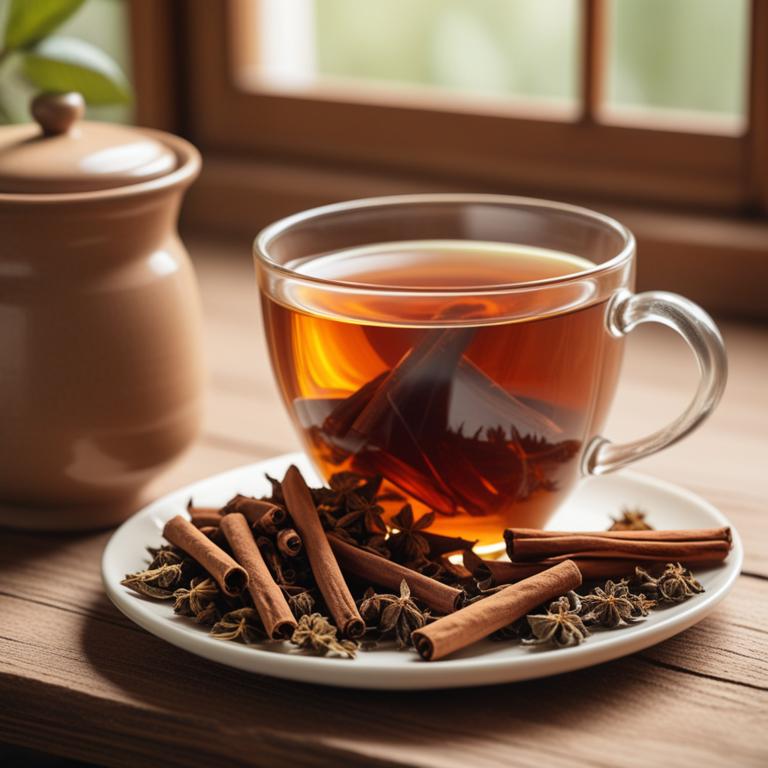
Cinnamomum zeylanicum teas, derived from the bark of the Ceylon cinnamon tree, have been traditionally used to treat menstrual cramps.
The analgesic and anti-inflammatory properties of this herbal preparation help to alleviate the pain and discomfort associated with cramps.
The bioactive constituents, including cinnamaldehyde, eugenol, and linalool, in Cinnamomum zeylanicum teas have been found to inhibit the release of prostaglandins, which are hormones responsible for inducing cramps.
By reducing prostaglandin levels and exerting anti-inflammatory effects, Cinnamomum zeylanicum teas provide relief from menstrual cramps, making it a beneficial herbal remedy for women suffering from this condition.
Related Study
According to "Journal of ethnopharmacology", Cinnamomum zeylanicum teas possess an anti-nociceptive effect, indicating potential relief from cramps.
10. Avena sativa teas

Avena sativa teas have been traditionally used to treat menstrual cramps due to their anti-inflammatory, antispasmodic, and sedative properties.
The bioactive constituents of Avena sativa, including avenacoside and avenanthramides, help to relax the uterine muscles, reduce prostaglandin levels, and alleviate pain.
By reducing inflammation and muscle contractions, Avena sativa teas provide relief from menstrual cramps, promoting a sense of calm and comfort.
The benefits of using Avena sativa teas to treat menstrual cramps include reduced pain, improved sleep, and a decrease in anxiety and stress.
11. Foeniculum vulgare teas

Foeniculum vulgare teas, also known as fennel tea, have been used for centuries to treat menstrual cramps.
The tea's properties help to ease cramping by reducing inflammation, relaxing uterine muscles, and improving digestion, thereby providing relief from the discomfort associated with menstrual cramps.
The bioactive constituents of fennel tea, such as volatile oils like anethole and fenchone, help to inhibit prostaglandin production, which is a key factor in causing menstrual cramps.
The benefits of consuming fennel tea for menstrual cramps include natural pain relief, improved menstrual regularity, and reduced symptoms of premenstrual syndrome (PMS).
Related Study
According to "International journal of gynaecology and obstetrics: the official organ of the International Federation of Gynaecology and Obstetrics", Foeniculum vulgare teas for cramps, which is the essence of Fennel's fruit with 2% concentration (25 drops q4h orally), can be used as a safe and effective herbal drug for primary dysmenorrhea, although it may have a lower potency than mefenamic acid in the dosages used for this study.
12. Taraxacum officinale teas

Taraxacum officinale teas, also known as dandelion root tea, have been used to treat menstrual cramps due to their anti-inflammatory and antispasmodic properties.
These properties help to relax the uterine muscles and reduce pain, providing relief from cramps.
The bioactive constituents responsible for this effect include flavonoids, terpenoids, and sesquiterpenes, which have been shown to inhibit the production of prostaglandins, hormone-like substances that stimulate uterine contractions.
By reducing prostaglandin production and relaxing the uterine muscles, Taraxacum officinale teas can provide effective relief from menstrual cramps, making it a popular natural remedy for this common ailment.
13. Zingiber officinale teas

Zingiber officinale teas, also known as ginger tea, have been traditionally used to treat menstrual cramps due to its anti-inflammatory and analgesic properties, which help to relax the uterine muscles and reduce pain.
The bioactive constituents of ginger tea, such as gingerols and shogaols, have been shown to inhibit the production of prostaglandins, which are hormones that cause the uterus to contract and lead to cramping.
By reducing the severity of uterine contractions, ginger tea helps to alleviate menstrual cramps and provide relief from symptoms such as bloating, nausea, and abdominal pain.
The benefits of using ginger tea to treat menstrual cramps include its natural and non-habit-forming properties, making it a safe and effective alternative to over-the-counter pain relievers.
Related Study
According to "BioFactors (Oxford, England)", Zingiber officinale teas for cramps may be beneficial due to the anti-inflammatory functions of ginger, which can inhibit various pro-inflammatory cytokines and pathways involved in inflammation.